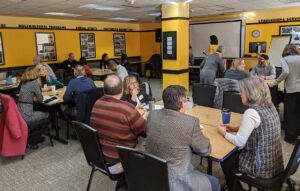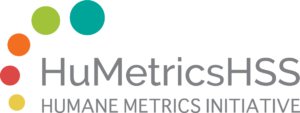Workshop Guide
HuMetricsHSS is an initiative born of a sense that in the academy we tend to evaluate what we can measure — e.g., the number of peer-reviewed publications or the number of citations — and not measure what we value. And because we only have so much time in the day, we respond to where we are rewarded — which can lead to some pretty toxic behaviors.

We designed the following exercises to help you and your colleagues answer the question "What would it look like if we could instead incentivize scholarship and academic citizenship that enriched our collective scholarly lives?"
The descriptions of each exercise give specific goals, but the overall objective of this set of exercises is to think together about the processes of scholarship rather than its products, to help you begin to tell a more complete story of all the work you do, the values that drive that work, and the ways — indicators, metrics (quantitative or qualitative), etc. — that you might be able to capture that work and make it understood.
The exercises that follow will help you and your workshop participants do the following:
-
- Think through what we do in our day-to-day work in the academy, what we want to do or wanted to do when we set ourselves on the path to working in the academy, what we're rewarded for doing, and highlight the discrepancies between those things;
-
- Re-examine how we think about scholarly work, moving away from a "product"-oriented mentality and toward a "process"-oriented one. It is one of our core beliefs that doing, recognizing, and rewarding scholarly activity that is rooted in our values makes for a better academy. It can be hard to think about what values-inflected scholarship might look like when you focus on the object alone rather than the processes that went into it. Focusing on the processes, through, gives us space to enact our values through micro-transactional decisions, to shift from the "what" to the "how": how the sausage is made, not just on the sausage.
-
- Tell a more textured story about your work, one that is in line with your values and the stated values of your institution, and, crucially, have that story be heard to provide you with a shared vocabulary to discuss engaged scholarship.
-
- Think differently about how we might capture the "value" of a broader range of scholarly work, conducted in accordance with your values, in a way that would resonate in your specific institutional context. This may take the form of new metrics/indicators, or other quantitative/qualitative approaches to reflecting the breadth of your scholarship in your local environment.
